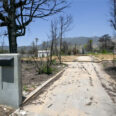
The Pasadena Planning Commission voted 4-3 on May 28 to initiate amendments to the Lincoln Avenue Specific Plan (LASP) and the city’s zoning code that could pave the way for a proposed Starbucks fast-food restaurant at 1900 Canada Ave., a vacant parcel formerly owned by Caltrans.
The motion to initiate passed with commissioners Jay Walters, Jennifer Higginbotham, Philip Burns and Michael Albrecht voting in favor, while Commissioners Mic Hansen, Julianna Delgado, and Chair Carol Hunt Hernandez voted against.
The site, located adjacent to the 210 Freeway at the intersection of Canada and Lincoln avenues, currently lacks a General Plan land use designation and retains its legacy zoning of Public, Semi-Public, which prohibits commercial uses. The applicant purchased the site from Caltrans in 2020 and submitted a Predevelopment Plan Review in November to construct a 2,400-square-foot, one-story Starbucks.
The amendments would bring the 23,220-square-foot property into the LASP boundary, assign it a Commercial Limited zoning designation, and allow restaurant uses — including formula fast-food establishments — by right within that zone.
Several community members voiced opposition to the proposal.
One local business owner opposed the move, saying that “independently owned, local businesses are the backbone of this unique community and cannot compete with corporate chains.”
Selena Alvarez, executive director of Housing Works and an Altadena resident, urged commissioners to pause the initiation, citing community trauma from recent fires and concerns about gentrification.
“I think that it’s worth pausing on making a decision whether to move this initiation forward. I don’t think it’s the right time for the community. The community has suffered a tremendous amount of loss and I think that there needs to be weigh in from the community because something like a Starbucks coming into that community, there’s already already signs of gentrification happening in our neighborhood,” Alvarez said.
Blair Smith, a District 1 resident living near the site, expressed concerns about traffic patterns and safety, particularly regarding the dangerous intersection where parking would be located.
Smith said: “I’m deeply concerned that this is going to create more congestion, more automobile reliance in our neighborhood and result in less walkability, which is really the intent of the Lincoln Boulevard specific plan.”
Commissioner Julianna Delgado expressed concerns about the proposal, saying a standalone fast-food restaurant with front parking “seems sort of antithetical as to what the Lincoln Avenue specific plan is trying to achieve to become more walkable, more sustainable.”
She noted the project would receive less oversight since buildings under 5,000 square feet don’t require design commission review.
Commissioner Hansen agreed, saying the city should prioritize local businesses displaced by recent fires over national chains, and called for more thorough studies of traffic and parking impacts.
But Commissioner Albrecht argued that initiation would allow staff to conduct proper analysis and provide more community engagement opportunities. “We have no way of knowing all the different ways the traffic could or could not be affected without having staff and the Department of Transportation do the analysis,” she said.
Applicant representative Francis Esparza confirmed the developer has been in preliminary negotiations with Starbucks, though no commitment has been made.
The proposed development would not include a drive-through component, which remains prohibited in the specific plan.
As part of the initiation, the commission also directed staff to evaluate the Mixed Use Neighborhood (MUN) zoning designation as an alternative to the proposed Commercial Limited zoning.
Staff noted that this type of initiation is extremely rare — the last similar case occurred approximately 20 years ago.
City planners emphasized that initiating the amendments does not constitute project approval, nor does it obligate the city to approve any future development.
A full environmental review under the California Environmental Quality Act (CEQA) will be required before the amendments return to the Planning Commission for a recommendation.
The commission will then make a recommendation to the City Council, which will make the final decision after additional public hearings.
Staff indicated they would coordinate with the District 1 Councilmember Tyron Hampton’s office and conduct extensive community outreach, including potentially reaching out to John Muir High School, which is located nearby, as part of the formal review process.














 2 comments
2 comments

